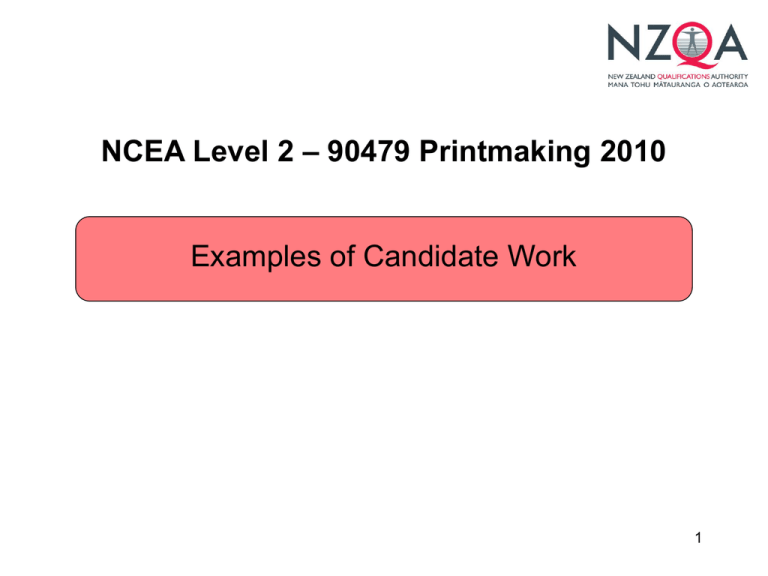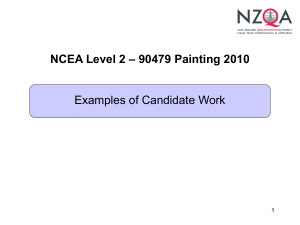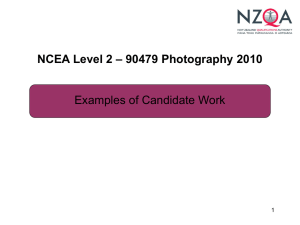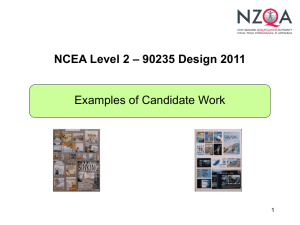presentation format
advertisement

NCEA Level 2 – 90479 Printmaking 2010 Examples of Candidate Work 1 Excellence 2 3 This submission was verified at the highest end of an Excellence grade. This portfolio presents evidence beyond that expected to meet requirements of The New Zealand Curriculum, Learning Media, Ministry of Education, 2007, and relates to the following strands in Visual Arts, Level 7: Understanding the Arts in Context; Developing Practical Knowledge; Developing Ideas; Communicating and Interpreting. From the introduction of the theme at the top of panel one, this candidate has moved quickly to identify a personal direction based on pictorial concerns including line, pattern, shape, scale, layers and limited colour. A clear and exciting proposition has been developed into outstanding printmaking. The processes and techniques selected have been employed with facility and the artist references integrated into the candidate’s own work. Ideas have been competently generated though sequences of drawings and prints, systematically developed and purposefully regenerated into comprehensive and intelligent outcomes. Clarification is evident in the intelligent selection of visual elements, recombined with different print processes. The introduction of different media has enhanced the work to produce aesthetically sophisticated images. Established practice is diverse and implicit in the field of formal geometric abstraction with more specific references to artists such as Sol le Witt, Ron Davis, Sara Hughes, Terry Frost, Milan Mrkusich and Sandy Adsett. 4 5 6 7 This submission was verified in the mid-Excellence grade range. This portfolio presents outstanding evidence to meet requirements of The New Zealand Curriculum, Learning Media, Ministry of Education, 2007, and relates to the following strands in Visual Arts, Level 7: Understanding the Arts in Context; Developing Practical Knowledge; Developing Ideas; Communicating and Interpreting. Ideas have been competently generated though sequences of portrait drawings, systematically developed and purposefully extended into comprehensive and intelligent outcomes. Clarification is evident in the intelligent selection of visual elements, recombined with different print processes. Regeneration of ideas occurs on the bottom of panel two where the candidate has revisited earlier developments on framing the figure in space and re-worked ideas from established practice. From the introduction of the theme through sequences of purposeful drawings and prints that explore line, scale, tone and limited colour this candidate has established an exciting proposition that develops into some excellent printmaking. The processes and techniques selected have been employed with facility and the artist references have been integrated into the candidates own work. Established practice is diverse and implicit with more specific references to David Salle and Merlin Carpenter. 8 9 10 11 This submission was verified at the lower end of the Excellence grade range. This portfolio presents outstanding evidence to meet requirements of The New Zealand Curriculum, Learning Media, Ministry of Education, 2007, and relates to the following strands in Visual Arts, Level 7: Understanding the Arts in Context; Developing Practical Knowledge; Developing Ideas; Communicating and Interpreting. This candidate has purposefully used drawing to explore pictorial elements and compositional devices and demonstrates a systematic approach in generating and developing ideas. The drawings and prints on the first panel show a clear development from the initial proposition set out early in panel one and a consistent enquiry into these ideas by the final works at the bottom of panel two. Ideas have been clearly set out from the beginning and are systematically extended with the interplay of complex layering and overlapping of different images. Critical decisions have been made in the use of line, shape, manipulating scale, repetition and transparency. The use of a limited colour palette, changes of scale and layering of images combined with appropriate handling and understanding of print media linked to established practice, has resulted in a consistent body of work, although the references are more implicit than explicit. Regeneration of ideas occurs through the re-integration of images into other images reworked in a variety of ways, as seen throughout the submission. Although this submission provides sufficient evidence to meet the criteria for Excellence, it is placed on the lower end of the grade because it is not sufficiently critical in the approach and regeneration of ideas. 12 13 14 Merit 15 16 This submission was verified at the higher end of the Merit grade range. This portfolio presents sound evidence to meet requirements of The New Zealand Curriculum, Learning Media, Ministry of Education, 2007, and relates to the following strands in Visual Arts, Level 7: Understanding the Arts in Context; Developing Practical Knowledge; Developing Ideas; Communicating and Interpreting. This candidate demonstrates control and understanding in the use of appropriate processes, procedures, materials and techniques from established practice. There is sufficient evidence of generation and development of the ideas on panel one, in the investigation of environmental issues using a narrative approach, that explores ideas around pollution and the environment. There is also evidence of an extension of ideas in the works on panel two with found images used in combination with the candidate’s own observational drawings and print studies. The thematic intentions are clear, however this was not supported by equally challenging pictorial ideas, which places this submission within the Merit grade range. The sensitivity of the drawings and prints with studies of scale and viewpoint places this submission at the high end of the Merit grade. Technical facility was clearly evident throughout the portfolio. For this submission to achieve with Excellence the candidate would need to show more evidence of a systematic and critical approach to the clarification of ideas established on panel one and a regeneration of a depth of ideas on panel two. 17 18 19 20 This submission was verified at the higher end of the Merit grade range. This portfolio presents sound evidence to meet requirements of The New Zealand Curriculum, Learning Media, Ministry of Education, 2007, and relates to the following strands in Visual Arts, Level 7: Understanding the Arts in Context; Developing Practical Knowledge; Developing Ideas; Communicating and Interpreting. This candidate worked well in the Expressionist genre, extending and exploring ideas confidently within the thematic proposition. The exploration of different surfaces, combination of processes, together with a dramatic chiaroscuro and use of plate tone, is a distinctive characteristic and has advantaged this submission. Although the Expressionist model is an excellent one for the print candidate, it is still recommended that technical and print conventions are observed and maintained. While it may be acceptable to eliminate borders, the complete disregard for the print edge can be a disadvantage to the reading of the image. For this submission to achieve an Excellence grade, the candidate would need to have recognised the potential of the works at the top of panel two and to clarify and regenerate their ideas to demonstrate a more critical and purposeful line of inquiry. The decisions around scale, repetition and reuse of large images restricted the potential for regeneration. 21 22 23 24 This submission was verified at a Merit grade. This portfolio presents sound evidence to meet requirements of The New Zealand Curriculum, Learning Media, Ministry of Education, 2007, and relates to the following strands in Visual Arts, Level 7: Understanding the Arts in Context; Developing Practical Knowledge; Developing Ideas; Communicating and Interpreting. This candidate shows understanding in the use of appropriate processes, procedures, materials and techniques from established practice. Images were manipulated to introduce ideas around framing, scale and layering. Ideas were generated using a series of photographic print processes; however, the reliance on direct use of found images may have inhibited the candidate’s ability to explore the ideas further. The possibilities for extension were recognised and applied but there is limited evidence of a clarification or critical approach in the final works on panel two, which places this submission in the mid-Merit grade range. For this submission to move higher in the Merit grade range, the candidate would need to show more evidence of how ideas could be successfully regenerated in the works on panel two. 25 26 27 28 This submission was verified at the lower end of the Merit grade range. This portfolio presents sound evidence to meet requirements of The New Zealand Curriculum, Learning Media, Ministry of Education, 2007, and relates to the following strands in Visual Arts, Level 7: Understanding the Arts in Context; Developing Practical Knowledge; Developing Ideas; Communicating and Interpreting. This candidate uses drawing and small prints to generate and develop ideas. The small figurative etchings explore the ideas and establish the narrative of the portfolio. These drawings address the disastrous oil spill in the gulf and its ecological implications and also show understanding in the use of appropriate processes, procedures, materials and techniques from established practice. There is sufficient evidence of a development of ideas on panel one and this work provided opportunities for extension. However, the random nature of the development is indicative of a submission that needed to operate more consistently around the theme. This places the submission at the lower end of Merit. For this submission to sit more comfortably within a Merit grade range, the candidate would need to show more evidence of how the ideas could be successfully extended in the works on panel two. 29 30 31 Achieved 32 33 This submission was verified in the mid-Achieved grade range. This portfolio presents sufficient evidence to meet requirements of The New Zealand Curriculum, Learning Media, Ministry of Education, 2007, and relates to the following strands in Visual Arts, Level 7: Understanding the Arts in Context; Developing Practical Knowledge; Developing Ideas; Communicating and Interpreting. This candidate used drawing to generate a limited proposition which dealt with adequate technical ability. The submission is characterized by repetition and the reuse of a small number of plates and visual language, including a narrow colour palette and use of compositional devices. There is evidence of the use of some processes, procedures, materials and techniques from established practice, including artists such as Pat Steir, Rodney Fumpston, Phillip Trustum and John Pule. This appeared somewhat superficial as a ‘formula’ was adopted and used throughout the portfolio, which limited possible extension and placed this submission in the mid Achievement grade range. For this submission to move closer towards a Merit grade, the candidate would need to explore a greater range and depth of ideas. 34 35 36 37 This submission was verified as sitting very close to the boundary between Achievement and Not Achieved. This portfolio presents sufficient evidence to meet requirements of The New Zealand Curriculum, Learning Media, Ministry of Education, 2007, and relates to the following strands in Visual Arts, Level 7: Understanding the Arts in Context; Developing Practical Knowledge; Developing Ideas; Communicating and Interpreting. Although the generation and development of ideas around text had potential, the development and use of appropriate print approaches was limited and demonstrated a low level of technical control. The reliance on photo mechanical reproduction and photocopies to generate ideas and the inconsistencies in the approach and layout is indicative of a portfolio that only just meets the criteria for Achieved. The use of scale to accentuate the development of ideas or indicate stronger work was not always understood. Some works took more space on the board than was justified by either their importance to the development or critical purpose. The drawing only just reaches the standard of Level 7 of The New Zealand Curriculum. This candidate would have benefited from the use of appropriate processes, procedures, materials and techniques and an exploration of ideas from established practice and artist references such as Robert Indiana, Jasper Johns, Robert Rauschenberg, Imants Tiller, Colin McCahon, Rosalie Gascoigne and John Reynolds. 38 39 40







